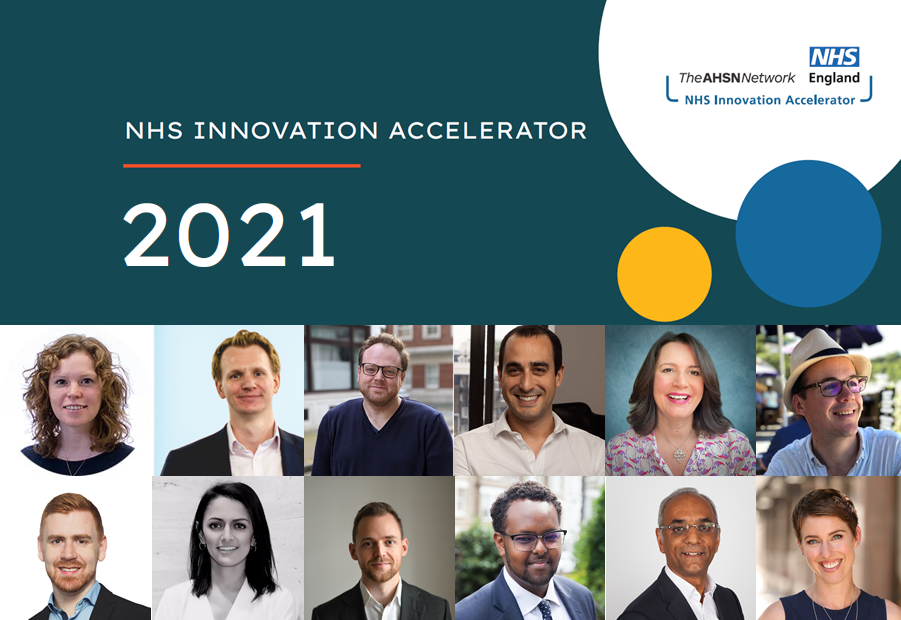
Today, the NHS Innovation Accelerator (NIA) announces the 12 innovators (‘Fellows’) and innovations selected to join its award-winning programme in 2021 – and we are thrilled to confirm the success of one of our amazing project partners/innovators, who has been hand-picked as part of this cohort. The 12 innovations selected offer solutions to some of the NHS’ most pressing needs and will be supported over the next three years to scale across England for the benefit of NHS patients and staff.
This year, the NIA sought evidence-based innovations that address key NHS priorities: supporting the workforce, mental health and COVID-19 response. From remote patient monitoring and diagnostics to virtual clinical training for staff, the 2021 cohort represents a range of solutions that are set to transform the health and social care system in England.
Each innovation – and its representative Fellow – were selected through a robust, multi-stage assessment process involving a college of expert clinicians, patients and commercial leads drawn from a range of organisations including NHS England and NHS Improvement, NHSX, the Academic Health Science Networks (AHSNs) and NICE.
KiActiv® is a clinically proven digital therapy designed to improve the self-management of long-term health conditions – an innovation that here, in the West of England, we have been working with as part of our Future Challenges programme. In response to the news, Tommy Parker, CEO of KiActiv®, told us: “I am very pleased to have been selected as a Fellow by the NIA. The support will enable us to build on what we’ve achieved with the West of England AHSN, scale KiActiv® more widely across the NHS, and showcase the impact of personal everyday physical activity as a medicine.”
The announcement marks the sixth cohort joining the NIA, which is an NHS England and NHS Improvement initiative delivered in partnership with England’s 15 AHSNs, hosted at UCLPartners. Since it launched in 2015, the NIA has supported the uptake and spread of 74 evidence-based innovations across more than 2,475 NHS sites.
In recognition of the new cohort, Professor Stephen Powis, Chair of the NIA and National Medical Director for NHS England and NHS Improvement, said:
“After a year like no other for the NHS, the importance of innovation has never been more clear. From the way we deliver services to how we support the health and social care workforce, innovation has proven critical to ensuring we remain able to care for NHS patients and staff effectively and efficiently.
The 12 innovations joining the NHS Innovation Accelerator in 2021 meet the needs of the NHS at this critical time and will be supported to scale across England for even greater patient benefit.”
The 12 innovations selected to join the NHS Innovation Accelerator in 2021 are:
- AcuPebble SA100: a wearable CE-marked medical device able to accurately and non-invasively diagnose sleep apnoea from the patient’s home.
- Brain in Hand: a digital innovation using coaching principles and practical support to help people living with anxiety and other neurodevelopmental conditions.
- Cyted: a digital diagnostic infrastructure to provide services for the earlier detection of disease through proprietary machine learning.
- Definition Health: a digital pre- and post-op communications tool between hospital and patient, providing the first end to end journey for surgical patients in the UK.
- Feebris: a mobile-based software platform powered by AI that helps users (clinical or non-clinical) to detect and triage respiratory deterioration remotely.
- Infinity Health: a digital platform on which health and care staff log, share and coordinate their daily tasks in real-time, replacing paper-based manual methods.
- KiActiv: a mentor-guided digital service that empowers people to make sustainable behaviour change in the context of their health, capacity and environment, without the need to visit gyms or clinics.
- Little Journey: a smartphone-based health behaviour modification tool that provides end-to-end support for families to reduce children’s anxiety before a healthcare procedure.
- MUTU System: an at-home online programme of exercises to help women heal and strengthen from pelvic symptoms and associated mental health concerns post-baby.
- Oxford Medical Simulation: providing clinical experiences on demand through the use of virtual reality so doctors and nurses can practice caring for virtual patients whenever they need to.
- Oxehealth: a contact-free vision-based patient monitoring platform for use in hospitals (mental health) and nursed facilities.
- Vinehealth: a digital platform that uses behavioural science and AI to improve the quality of life and survival of cancer patients through highly personalised patient support.
ABOUT THE NHS INNOVATION ACCELERATOR
The NHS Innovation Accelerator (NIA) is an award-winning NHS England initiative delivered in partnership with England’s 15 Academic Health Science Networks (AHSNs), hosted at UCLPartners. It supports delivery of the NHS Long Term Plan priorities by accelerating uptake of high impact innovations for patient, population and NHS staff benefit, and providing practical insights on spread to inform national strategy.
Since it launched in July 2015, the NIA has supported 72 Fellows representing 74 innovations to spread across the NHS, making a significant impact. To date, over 2,475 additional NHS sites are now using NIA innovations, our innovators have raised £174.3m in external funding, 746 jobs have been created, 131 awards won, and 49 NIA innovations are now selling internationally.
For more information about the NIA, visit www.nhsaccelerator.com or email nia@uclpartners.com
If you are a healthcare innovator, looking for business development support and tools, get in touch with us at the West of England AHSN. You can visit our Innovation Exchange for expert advice, information about funding opportunities, and to make contact with our team to access support.
Posted on March 8, 2021


